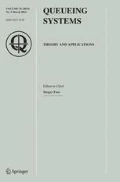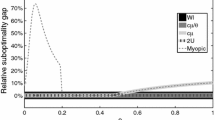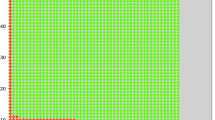Abstract
It is well known that the \(c\mu \)-rule is optimal for serving multiple types of customers to minimize the expected total waiting cost. What happens when less valuable customers (those with lower \(c\mu \)) can change to valuable ones? In this paper, we study this problem by considering two types of customers. The first type of customers is less valuable, but it may change to the second type (i.e., more valuable customers) after a random amount of time. The resulting problem is a continuous-time Markov decision process with countable state space and unbounded transition rates, which is known to be technically challenging. We first prove the existence of optimal non-idling stationary policies. Based on the smoothed rate truncation, we derive conditions under which a modified \(c\mu \)-rule remains optimal. For other cases, we develop a simple heuristic policy for serving customers. Our numerical study shows that the heuristic policy performs close to the optimal, with the worst case within 2.47 % of the optimal solution and 95 % of the examples within 1 % of the optimal solution.


Similar content being viewed by others
References
Akan, M., Alagoz, O., Ata, B., Erenay, F., Said, A.: A broader view of designing the liver allocation system. Oper. Res. 60(4), 626–633 (2012)
Anderson, W.J.: Continous-Time Markov Chains. Springer, Berlin (1991)
Bassamboo, A., Randhawa, R.S.: On the accuracy of fluid models for capacity sizing in queueing systems with impatient customers. Oper. Res. 58, 1398–1413 (2010)
Bertsekas, D.P.: Dynamic Programming and Optimal Control, II edn. Athena Scientific, Belmont, Massechusetts (2001)
Bhulai, S., Brooms, A.C., Spieksma, F.M.: On structural properties of the value function for an unbounded jump Markov process with an application to a processor sharing retrial queue. Queueing Syst. 76(4), 425–446 (2014)
Blok, H.: Markov decision processes with unbounded transition rates: structural properties of the relative value function. Master thesis, Utrecht University (2011)
Blok, H., Spieksman, F.M.: Continuity and ergodicity properties of a parametrised collection of countable Markov processes. Techinical report, Leiden University (2013)
Bremaud, P.: Point Processes and Queues: Martingale Dynamics. Springer Series in Statistics, New York (1981)
Buyukkoc, C., Varaiya, P., Walrand, J.: The \( c\mu \)-rule revisited. Adv. Appl. Probab. 17(1), 237–238 (1985)
Choi, B.D., Kim, B.: Non-ergodicity criteria for denumerable continuous time Markov processes. Oper. Res. Lett. 32, 574–580 (2004)
Cox, D.R., Smith, W.L.: Queues. Methuen, London (1961)
Down, D.G., Lewis, M.E.: The N-network model with upgrades. Probab. Eng. Inf. Sci. 24(2), 171–200 (2010)
Down, D.G., Koole, G.M., Lewis, M.E.: Dynamic control of a single server system with abandonments. Queueing Syst. 69, 63–90 (2011)
Foss, S.G.: Queues with customers of several types. In: Borovkov, A.A. (ed.) Advances in Probability Theory: Limit Theorems and Related Problems, pp. 348–377. Optimization Software (1984)
Glazebrook, K.D.: Scheduling tasks with exponential service times on parallel processors. J. Appl. Probab. 685–689 (1979)
Glazebrook, K.D.: Scheduling stochastic jobs on a single machine subject to breakdowns. Nav. Res. Logist. Q. 31(2), 251–264 (1984)
Guo, X.P.: Contrained optimization for average-cost continuous-time Markov decision processes. IEEE Trans. Autom. Control 52, 1139–1143 (2007)
Guo, X.P., Hernandez-Lerma, O.: Continous-Time Markov Decision Processes: Theory and Applications. Springer, London (2009)
Guo, X.P., Piunovskiy, A.: Discounted continuous-time Markov decision processes with constraints: unbounded transition and loss rates. Math. Oper. Res. 36, 105–132 (2011)
Guo, X.P., Ye, L.: New discount and average optimality conditions for continuous-time Markov decision processes. Adv. Appl. Probab. 42, 953–985 (2010)
Guo, X.P., Zhang, W.: Convergence of controlled models and finite-state approximation for discounted continuous-time Markov decision processes with constraints. Eur. J. Oper. Res. 238, 486–496 (2014)
He, Q.-M., Xie, J.G., Zhao, X.B.: Priority queue with customer upgrades. Nav. Res. Logist. 59, 362–375 (2012)
Kitaev, M.Y., Rykov, V.V.: A service system with a branching flow of secondary customers. Autom. Remote Control 41(9), 52–61 (1980)
Koole, G.M.: Monotonicity in Markov reward and decision chains: theory and applications. Found. Trends Stoch. Syst. 1, 1–76 (2006)
Muller, A., Stoyan, D.: Comparison Methods for Stochastic Models and Risks. Wiley, Baffins Lane, Chichester (2002)
Neuts, M.: Matrix-Geometric Solutions in Stochastic Models: An Algorithmic Approach. The Johns Hopkins University Press, Baltimore (1981)
Oksendal, B., Sulem, A.: Applied Stochastic Control of Jump Diffusions. Springer, Berlin (2005)
Pang, G., Yao, D.D.: Heavy-traffic limits for a many-server queueing network with switchover. Adv. Appl. Probab. 45(3), 645–672 (2013)
Piunovskiy, A.: Controlled jump Markov processes with local transitions and their fluid approximation. WSEAS Trans. Syst. Control 4(8), 399–412 (2009)
Piunovskiy, A., Zhang, Y.: The transformation method for continuous-time Markov decision processes. J. Optim. Theory Appl. 154(2), 691–712 (2012)
Prieto-Rumeau, T., Hernandez-Lerma, O.: Discounted continuous-time controlled Markov chains: convergence of control models. J. Appl. Probab. 49, 1072–1090 (2012)
Prieto-Rumeau, T., Lorenzo, J.M.: Approximating ergodic average reward continuous-time controlled Markov chains. IEEE Trans. Autom. Control 55(1), 201–207 (2010)
Puterman, M.L.: Markov Decision Processes: Discrete Stochastic Dynamic Programming. Wiley, New York (1994)
Ross, S.: Stochastic Processes, 2nd edn. Wiley, New York (1996)
Sennott, L.I.: Average-cost optimal stationary policies in infinite state Markov decision processes with unbounded costs. Oper. Res. 37(4), 626–633 (1989)
Sennott, L.I.: Stochastic Dynamic Programming and the Control of Queueing Systems. Wiley, New York (1999)
Serfozo, R.F.: An equivalence between continuous and discrete time Markov decision processes. Oper. Res. 27(3), 616–620 (1979)
Shaked, M., Shanthikumar, J.G.: Stochastic Orders. Springer, New York (2007)
Smith, W.E.: Various optimizers for single-stage production. Nav. Res. Logist. Q. 3, 59–66 (1956)
Stidham, S., Weber, R.: A survey of Markov decision models for control of networks of queues. Queueing Syst. 13, 291–314 (1993)
Ungureanu, V., Melamed, B., Katehakis, M., Bradford, P.G.: Deferred assignment scheduling in cluster-based servers. Clust. Comput. 9(1), 57–65 (2006)
Ungureanu, V., Melamed, B., Katehakis, M.: Effective load balancing for cluster-based servers employing job preemption. Perform. Eval. 65(8), 606–622 (2008)
Van Mieghem, J.A.: Dynamic scheduling with convex delay costs: the generalized \(c\mu \)-rule. Ann. Appl. Probab. 5(3), 809–833 (1995)
Weber, R.R.: Scheduling jobs with stochastic processing requirements on parallel machines to minimize makespan or flowtime. J. Appl. Probab. 167–182 (1982)
Weber, R.R., Varaiya, P., Walrand, J.: Scheduling jobs with stochastically ordered processing times on parallel machines to minimize expected flowtime. J. Appl. Probab. 841–847 (1986)
Xie, J.G., He, Q.-M., Zhao, X.B.: Stability of a priority queueing system with customer transfers. Oper. Res. Lett. 36, 705–709 (2008)
Xie, J.G., He, Q.-M., Zhao, X.B.: On the stationary distribution of queue lengths in a multi-class priority queueing system with customer transfers. Queueing Syst. 62(3), 255–277 (2009)
Zhang, Y.: Average optimality for continuous-time Markov decision process under weak continuity conditions. J. Appl. Probab. 51, 954–970 (2014)
Acknowledgments
This work was supported by the NSFC under Grants 71201154, 71401159, and 71571176, and the Fundamental Research Funds for the Central Universities under Grants WK2040160009 and WK2040160011. The authors are grateful to Prof. Xiuli Chao and Prof. Xin Chen for their helpful discussions, and to the Editor-in-Chief Prof. Sergey Foss, an area editor and two referees for their thoughtful comments.
Author information
Authors and Affiliations
Corresponding author
Rights and permissions
About this article
Cite this article
Cao, P., Xie, J. Optimal control of a multiclass queueing system when customers can change types. Queueing Syst 82, 285–313 (2016). https://doi.org/10.1007/s11134-015-9466-6
Received:
Revised:
Published:
Issue Date:
DOI: https://doi.org/10.1007/s11134-015-9466-6
Keywords
- Change in customer type
- Multiclass queueing system
- Markov decision process
- Smoothed rate truncation method
- Unbounded transition rates




